Have you ever wondered, “what do raccoons like to eat,” when you see your trash bin tipped over again? Raccoons are omnivores and will eat almost anything—from frogs and insects in the wild to human food found in dumpsters.
In this post, you’ll find out about 9 surprising new foods raccoons might start eating by 2025—and how knowing these can help protect your home from these clever scavengers. Keep reading to stay ahead of these crafty creatures!
Key Takeaways
Raccoons happily eat a wide variety of foods—frogs, fish, fruit, nuts—naturally shifting menus as seasons change.
City raccoons often raid garbage cans, feasting on leftovers and food scraps, making them heavier (around 18.5 pounds in Toronto) than rural raccoons.
Pet food bowls left outdoors and open bird feeders become nightly feasts, regularly attracting hungry raccoons to your backyard.
As cities grow and waste handling gets better by 2025, raccoons could adjust diets even more, learning to snack on unexpected items like onions and garlic.
Eating human foods containing caffeine or cocoa can raise health risks for raccoons, but their clever adaptability helps them handle new diets and shifting habitats.
Table of Contents
A Raccoon’s Natural Diet
Raccoons eat a wide range of foods in the wild, making them true masters of survival. Their natural menu changes with the seasons and includes everything from fish and frogs to nuts and berries.
Fish, frogs, and crayfish
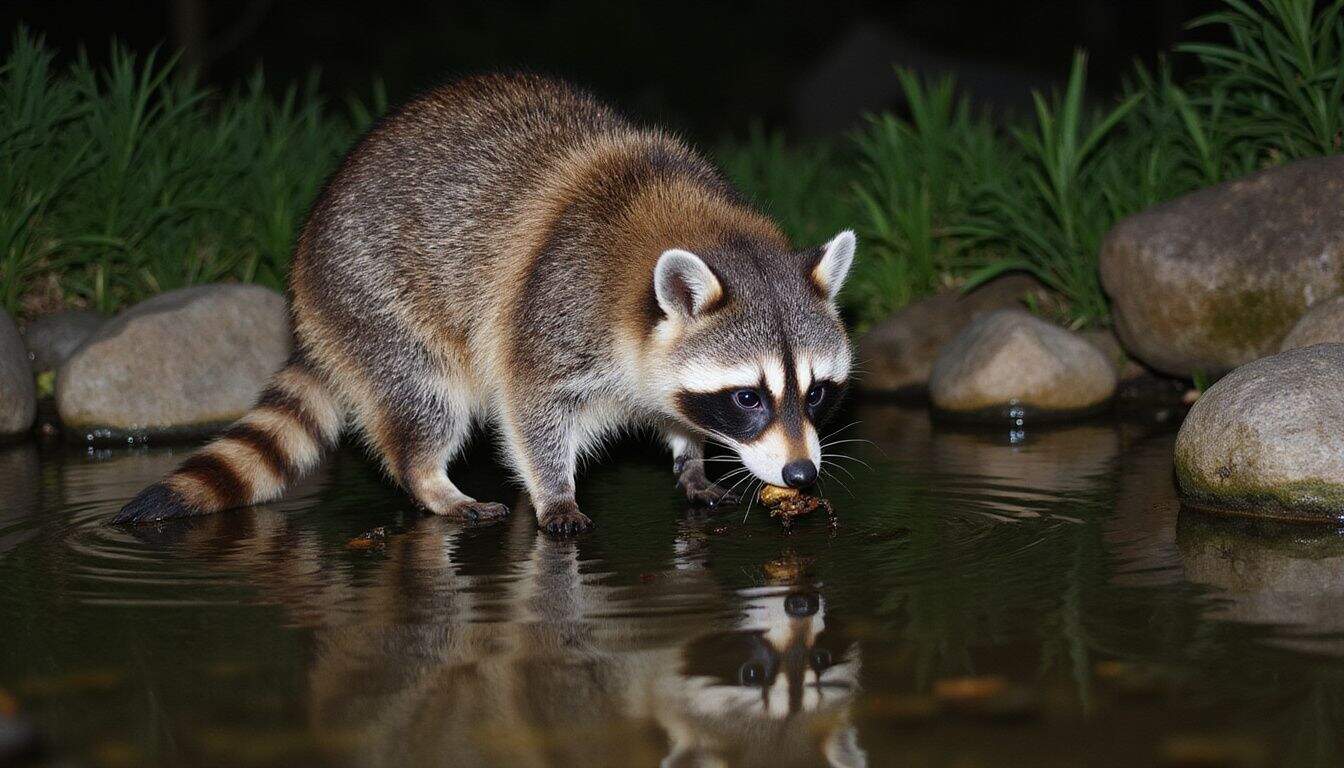
Wild raccoons often hunt in water to find food. These clever animals use their front paws like little hands, searching underwater for delicious snacks. Fish from streams and ponds are regular meals because raccoons move quickly and grab them easily.
Frogs become tasty meals too, as raccoons can notice even tiny movements in dark waters. They also hunt crayfish, flipping rocks and grabbing shellfish hiding underneath.
Near my backyard pond, I’ve seen these “wash bears”—as they’re sometimes called—in action. They step carefully into shallow water, feeling around gently with their paws. As soon as something edible turns up, raccoons quickly carry the catch back to shore to enjoy.
These natural hunters never need special tools or tricks… Powerful jaws and sharp teeth easily crush bones or shells. If raccoons become unwanted visitors in your yard, expert help from environment raccoon removal services can safely protect your space and respect wildlife habits.
Fruits, berries, and nuts
Raccoons don’t just love seafood—they eagerly enjoy plant-based goodies too. These clever creatures often munch on fruits, berries, and nuts in forests and even city backyards. I’ve seen raccoons climb apple and cherry trees effortlessly in my yard, grabbing ripe fruits with surprising grace.
Their nimble paws easily pluck berries from shrubs and scoop up nuts scattered on the ground. Acorns are a top choice, giving raccoons valuable fats to stay warm in winter.
The raccoon’s diet reflects its adaptability – from forest fruits to garden tomatoes, these masked foragers take full advantage of nature’s pantry.
Garden owners commonly discover these nighttime visitors feasting on grapes, tomatoes, and strawberries. Neighborhood vegetable gardens and fruit trees frequently attract raccoons eager for plant snacks.
Powerful molars help them crunch nuts and seeds without trouble. These nutritious choices are especially helpful during late summer and fall, preparing raccoons for chilly conditions ahead.
Folks often see these playful “trash pandas” grabbing fallen fruits beneath trees—or even carrying nuts away to stash as future snacks.
Insects and small mammals
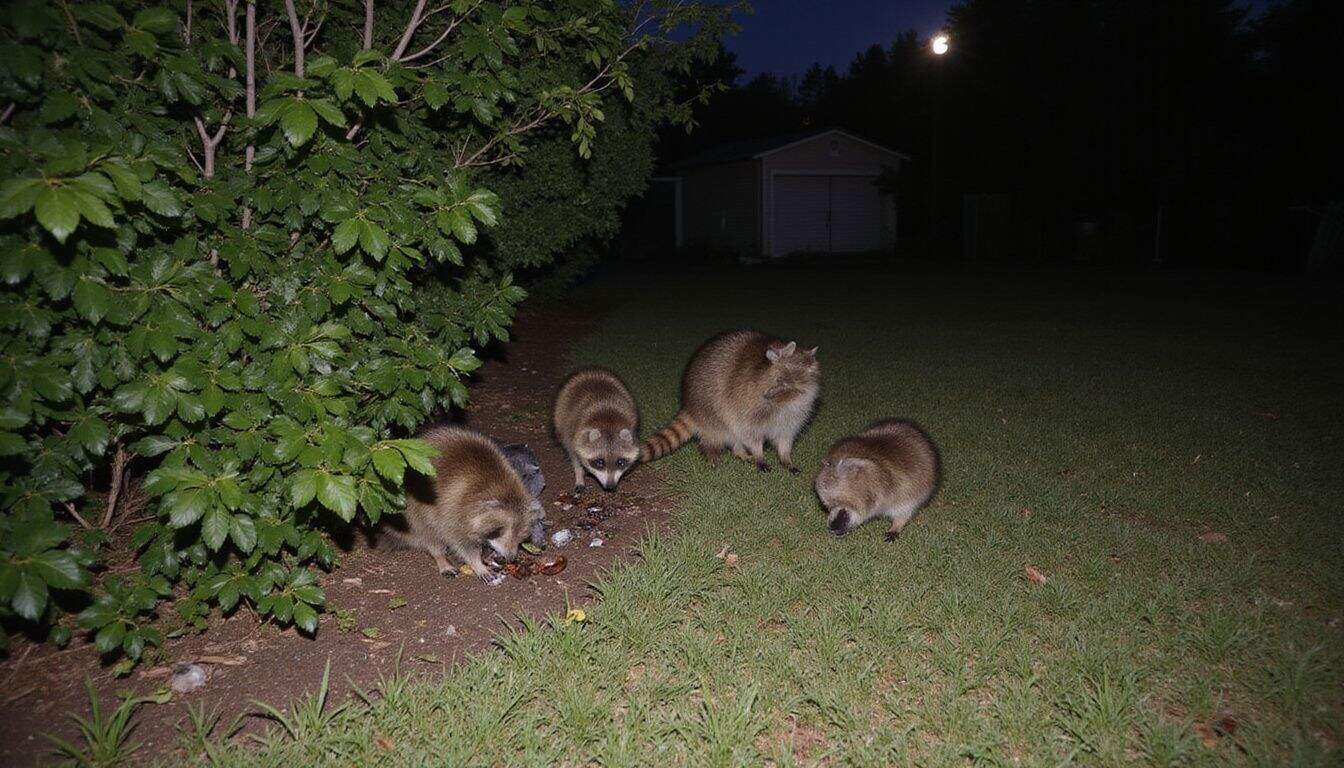
Fruits and nuts aren’t the only foods these masked bandits crave—they also love protein-rich snacks. During warm months, insects become a major part of their menu. I’ve seen raccoons flip over rocks in my yard, hunting beetles, grubs, and other crawling goodies.
With swift movements, these little creatures easily catch bugs using their quick, clever paws.
Small mammals rarely escape hungry raccoons at night. Using a sharp sense of smell, raccoons can track mice, voles, and shrews through the darkness. They often raid bird nests, eating eggs and young chicks—a habit that explains why fewer birds hang around my backyard after raccoon families settle in.
Sadly, this nighttime hunting lowers local animal numbers, because raccoons feed on both the prey animals and their offspring. Throughout the year, raccoons shift their eating habits to match seasonal changes—enjoying more bugs during warmer seasons and turning to small mammals when colder weather sets in.
Urban Raccoon Eating Habits
Urban raccoons have adapted to city life by changing their eating habits. These clever critters raid trash cans and dumpsters for easy meals that humans throw away.
Trash and food waste

Raccoons adore your garbage more than you’d ever imagine. These clever animals have perfected the skill of rummaging through trash in city neighborhoods—adapting their diets easily to whatever humans discard.
Known scientifically as Procyon lotor, these critters alter their eating patterns based on human waste. Research reveals city raccoons feeding regularly on human leftovers grow noticeably heavier than those living in rural spots.
In Toronto alone, researchers found raccoons accessing human food averaged around 8.40 kg, making them true experts in dumpster diving.
A raccoon’s trash is his treasure – especially when it contains last night’s leftovers.
Food scraps from our bins become nightly feasts for these hungry bandits. They eagerly dig for leftover meat, veggies, fruits, and sometimes chocolate—even though chocolate’s theobromine ingredient poses health risks to raccoons, [similar to rats](https://www.unfinishedman.com/how-to-get-rid-of-rats-from-home/).
Compost bins also provide easy access to snacks these nighttime scavengers find irresistible. In colder months, garbage bins become crucial sources of food, as natural food becomes harder to find.
Thriving on leftovers helps city raccoons become skilled survivors of modern urban environments.
Pet food and birdseed
Trash cans aren’t the only target these masked bandits go after in your yard. Pet food left outside acts like an open invitation to hungry raccoons. One morning, I found my dog’s food bowl totally empty after leaving it out overnight.
Curious to know who did it, I set up a quick camera the next night—turns out, the culprit was a plump raccoon who knew exactly what time dinner was served. Bird feeders can also draw these clever guests into your yard.
Raccoons climb poles, hang from branches, and do almost anything to get into seeds meant for birds. It’s a scavenging behavior that makes sense for their survival.
To prevent visits from these furry visitors, homeowners should clear away pet food quickly. Secure bird feeders with special raccoon guards called baffles, or simply bring feeders inside each night.
Taking these simple steps can greatly cut down on surprise raccoon visits. Raccoons can carry rabies, which makes their presence near homes risky for both pets and people. City food sources like pet kibble can change a raccoon’s natural foraging patterns.
Once they have quick, easy meals, raccoons hunt less often for natural foods—like rodents, amphibians, and bird eggs. Because they prefer moving around at night, raccoons become skillful thieves, quietly snatching meals while you peacefully sleep.
Seasonal Variations in Diet
Raccoons change their eating habits with the seasons. Their food choices shift from fresh fruits in summer to nuts and stored fat in winter.
Summer foods
In warm months, raccoons enjoy a natural feast. These little masked thieves happily munch on berries, cherries, and wild grapes, which grow plentifully during summer. I’ve seen them in my backyard before—carefully pulling ripe blackberries off bushes, somehow avoiding the sharp thorns.
Their diet of summer fruits helps them build important energy stores, providing fuel throughout the year. From June to September, fruit is their main meal. Occasionally, they’ll catch small animals like turtles or snakes if the opportunity presents itself.
Garden veggies aren’t out of reach either; raccoons eagerly snatch tomatoes off plants and raid corn from garden stalks. For this reason, many gardeners find these nightly intruders especially irritating—thanks to their craving for fresh produce.
Winter foods
Raccoons experience real struggles during winter. These clever animals face increased hardship as their usual food sources dwindle in colder months. To cope, raccoons depend heavily on scavenging—digging through snow to uncover nuts and seeds hidden earlier.
More and more, they approach human-populated areas for help, aiming to raid garbage bins, despite secured lids. Their nighttime routines allow them easy access to bird feeders and outdoor pet food dishes.
Some raccoons even hunt small reptiles or muskrats that remain active during winter. The rabies virus also poses a bigger risk now, since food shortages lead raccoons closer to humans and their pets.
Scarce supplies push these masked creatures to consume some strange finds. They may snack on frozen veggies or grass stems poking through layers of snow. City raccoons especially seek calorie-rich foods to survive harsh winter conditions.
Homeowners notice these animals breaking into sheds and garages looking for food stashes. Sharp claws, combined with impressive problem-solving abilities, help raccoons open containers easily.
Their urgent quest for winter nourishment explains why raccoons appear more persistent and daring as temperatures drop. Urban areas will keep changing, too—raccoon diets could look different by 2025 due to shifting city environments.
How Will Raccoon Diets Evolve in 2025?
By 2025, urban expansion will push these masked creatures to shift their diets even further. Already skilled at scavenging through our garbage and leftover meals, these intelligent animals are set to find new and unexpected food options.
Animal experts at Critter Stop predict these nocturnal foragers could increasingly seek out pet food left outdoors and raid backyard gardens—especially for vegetables like alliums, which other wildlife usually avoid.
With shrinking city water supplies limiting their aquatic prey, they may hunt more baby birds and small mammals such as squirrels.
Changing patterns in our food waste will shape their diets in the next few years. I’ve personally noticed this in my backyard—scraps they used to love now lie untouched, proving their quick adaptation skills.
With improved urban waste management, these clever mammals might find ways around secured garbage bins or sealed pet food containers. While their usual diet of fruits, nuts, and insects will still offer some nutrition, city-based raccoons are likely to depend less on such natural sources.
Eating more food meant for humans—especially items containing cocoa or caffeine—may heighten their risk of diseases, like rabies and raccoon roundworm. Yet, because they’re so adaptable, these clever scavengers might handle such substances better than cats or dogs.
People Also Ask
What foods do raccoons eat in the wild?
Raccoons eat a variety of foods—from grasses and plants, to fish, frogs, insects, and other small prey. They use sharp canine teeth to rip through their food easily. Being active at night helps them hunt quietly and safely, away from larger predators.
Are raccoons considered pests?
Yes, raccoons often become pests, especially in urban areas. They rummage through trash cans, dig up gardens, and can cause damage to homes while hunting for something to eat. Raccoons adapt quickly to city life, making neighborhoods their new habitat, regardless of address or location.
Do raccoons hunt other animals?
Raccoons regularly hunt smaller animals like frogs, fish, insects, and even birds or eggs on occasion. They use their front paws cleverly to grab aquatic prey from shallow streams or ponds, showing off their surprisingly skillful hunting abilities.
How can you tell if a raccoon might be rabid?
A raccoon with rabies usually acts strangely, coming out during daylight instead of hiding at night. They might look confused, show angry or aggressive movements, stumble, or struggle to walk normally. For your own safety, always stay far away from wild raccoons that behave oddly.
References
https://natureformysoul.com/2014/04/extra-clean-raccoons/
https://petcube.com/blog/what-do-raccoons-eat/ (2024-05-25)
https://www.crittercontrol.com/wildlife/raccoons/raccoon-diet/
https://nature-mentor.com/raccoon-diet/
https://www.sciencedirect.com/science/article/pii/S2213224423000032
https://pmc.ncbi.nlm.nih.gov/articles/PMC6025200/
https://www.bramptonwildlifecontrol.ca/what-do-raccoons-like-to-eat-the-gourmet-diets-of-brampton-s-raccoons (2024-03-20)


A cute little racoon adopted me a couple of years ago, she lives behind my house in the woods. This year while out in my yard, I started noticing she kept following me and just being curious. Love , Love, Love my new friend. Everyone who isn’t a racoon lover is telling me to kill it or have it removed by animal control. No! She stays, she is welcome in my yard and I will protect and feed her. Wish more people would care for them instead of killing them. We can all live in harmony with nature if you are a true animal lover. Unless they are rabid, they are not harmful. They are cute, funny and very cool. Thanks to all who share their love and kindness to these lovely creatures. Peace and God Bless.
Yes! They are amazing
I AGREE! Raccoons are intelligent, funny and appreciative beautiful animals. I have a mama who has adopted me and brings her sweet babies to visit and eat. I love them!!
I have a new found fur baby as well. She is missing her front left paw, so I break up all large bites of food for her. She absolutely loves Fruity pebbles cereal and so does the possum. I almost have my coon eating boiled eggs from my hand. I talk to them every night they come on my porch. I wait up every night until I see her to make sure she is ok. I’m praying she will become super friendly so I can pet her and hold her. That’s my dream.
We love our raccoons! My husband is fascinated by them ~ wondering what they think of him 🤔🥰
God bless you! More people need to be like you! Raccoons have a bad rap. They are actually very intelligent and gentle creatures. I had the same thing happen to me eleven years ago. I named my friend “Kitty” so when I was outside and would call her my neighbors wouldn’t know I had a raccoon friend. She was an adult when she first visited and she is still visiting making her over twelve years old. I have woods all around my house and am now up to thirteen raccoon friends! If it’s 45 degrees or above I am outside at 7 AM having my coffee and sharing peanuts, dog food, eggs and a treat now and then with my friendly raccoons. I have never seen a sick one. They all have different personalities and I find the babies to be super friendly once they get to know you. They sit with me on the swing and some of the babies have sat in my lap. They are wild though so you do have to take precautions. I change my clothes as soon as I go back into the house. And I wash my hands immediately. I wish people understood raccoons and if you don’t like them just let them be if they are in your yard. They will move on if there isn’t a food opportunity.
All your videos are si cute!
I have a sweet momma raccoon that comes every night to my deck to eat. I named her Stumpy because her tail is just a stump. She has now started bringing her 5 kids to eat here too.
Racoons are friendly. My husband and I have made friends with 4 of them. They come out every night to make sure we are home. They are adorable and Very friendly with us. All they want is something to eat just like any other animal. They get hungry just like us…..
I have been feeding a raccoon after finding his foot prints on my deck. I’ve named him Rocky Racoon and just learned I need to start feeding him eggs.
I have a ‘pet’ raccoon that has been coming in my cat door every night (for years!) to eat up all the cat food, and try to take the bag with him-but it’s too big and it gets stuck in the cat door opening. I call him Ruckus. But I have a million cats and I Don’t think they really like having him around, even though (Thank god!) there haven’t been any obvious arguments (yet-knock on wood!!) I lock the cat door at night, but he still sticks his little fingers in, and I can see his little eye looking at me, like “I live here, too!” I read relocation could be very bad for him, and he might end up not being able to find new food sources n a new territory, or worse, could find himself in someone elses territory and end up hurt. I can’t help but feel responsible for him! But I am totally responsible for my cats. So I’m trying to find food I Can leave out in the yard for Ruckus that the cats won’t want…and I think whole eggs just might be the answer!